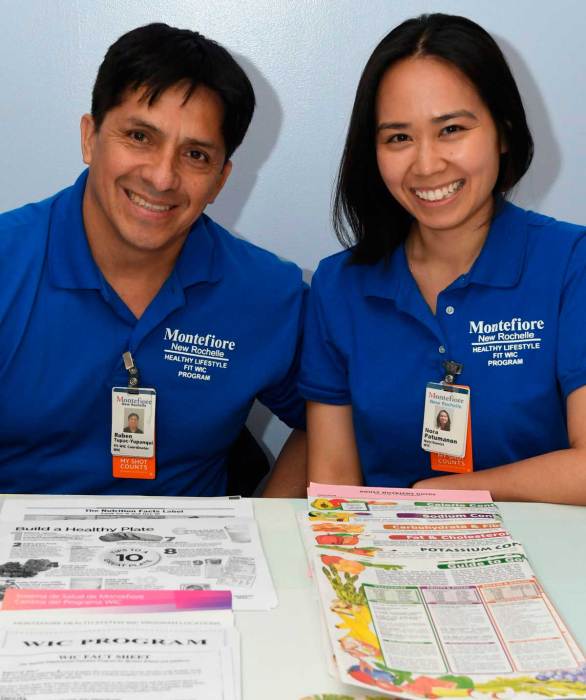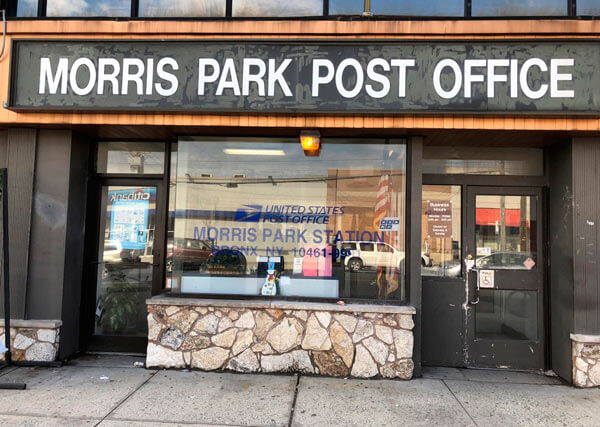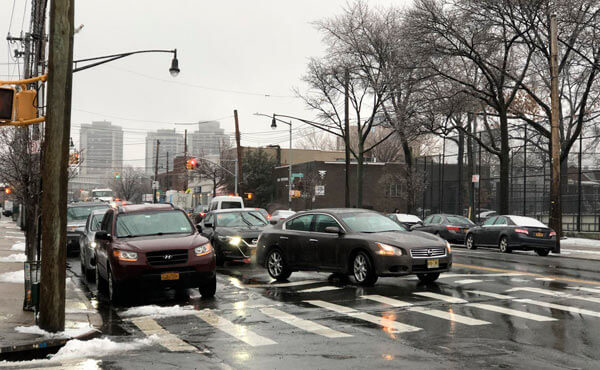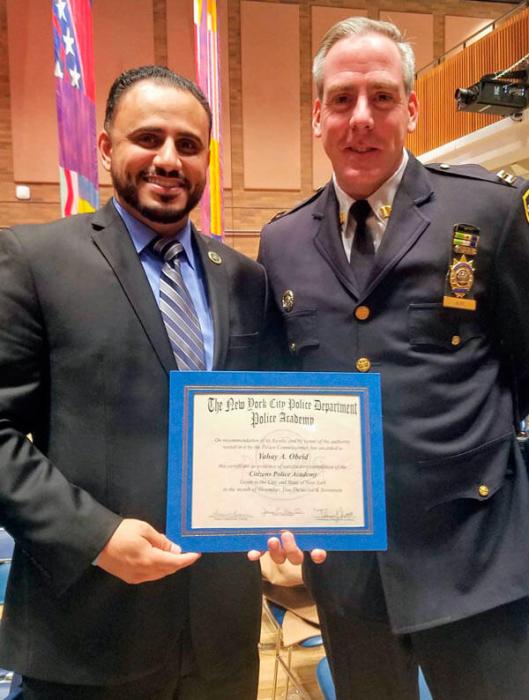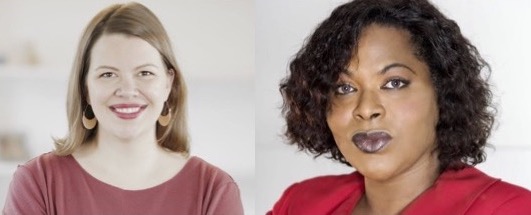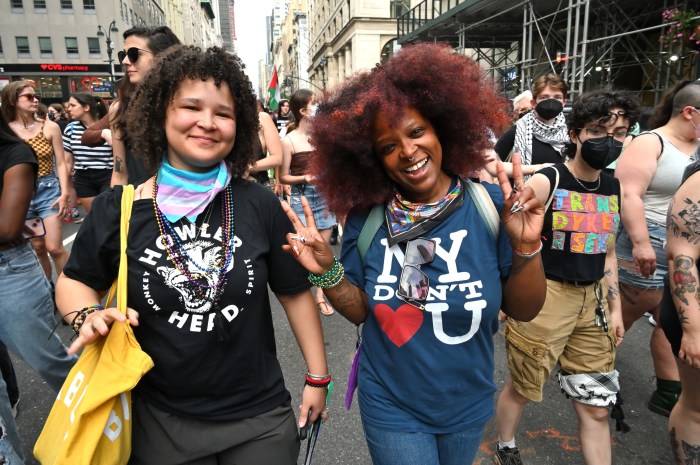People were spilling out the doors of the event space at Maestro’s Caterers.
Hot and sweaty, shoulder to shoulder, they weren’t there for a wedding or celebratory affair. They were there for a raucous Morris Park Community Association meeting about a controversial proposal called Just Home, which would provide supportive housing to homeless New Yorkers leaving jail with what NYC Health + Hospitals has described as complex medical needs, like stage-4 cancer, end-stage renal disease and congestive heart failure.
The project would be housed in a currently unused Jacobi Hospital building at 1900 Seminole Ave., in a northern section of Morris Park known as Indian Village, which residents, who may be geriatric, non-ambulatory or require oxygen tanks or wheelchairs, would enter through the Jacobi Hospital campus.
The Fortune Society, a nonprofit organization chosen by the city Department of Housing Preservation and Development to develop and operate the project, would bring social services to tenants on site along with 24/7 security and property management. The organization has a mission to help individuals with justice involvement rebuild their lives.
The project would also have low-income units that would be rented through the city Housing Preservation and Development Connect lottery system, with preference to Bronx Community District 11 residents.
A spokesperson for The Fortune Society told the Bronx Times he expects that supportive housing tenants will be coming out of jail — not prison — primary from Rikers Island. There would be a mix of people who were sentenced to a maximum of a year and are approved for release and pretrial detainees who have not yet been convicted but are being held in custody because they cannot make the bail that has been set for them, according to the spokesperson.
But residents wanted to get a clear message across at the July 19 meeting: they’re not welcome.
https://youtu.be/rU3Gn54F0PY
“No more housing for criminals!” someone screamed. Another shouted that the Bronx cannot take “one more person.”
When one person simply shouted “criminals!” another corrected them, yelling “animals!” referencing the prospective future neighbors.
One woman who lives near Jacobi Hospital brought a group of young people to the front of the room, saying they’re the future of the neighborhood.
“I have worked my entire life, I came from nothing. I have a house and you people are not taking it from me,” she told project representatives.
The idea that people moving onto the hospital’s property from Rikers Island would destroy the neighborhood she calls home was a shared theme among riled-up residents at the meeting.

Roy Mandina said he splurged to buy a home in the area because he wanted his family to live in a safe place.
“You don’t put a fox in a henhouse,” he said. “This is a residential neighborhood.”
Icahn Charter Schools Superintendent of Schools Edward Tom said parents and school leaders do not want the project coming to the neighborhood.
“With everything happening in our country from Uvalde and everything, our priority is children’s safety,” he said.
Detailed drawings for the plan are still being developed, so the exact number of apartments is still being determined, a NYC Health + Hospitals spokesperson told the Bronx Times. A June 8 slideshow about the project said there would be 100 studios, 60% supportive and 40% low-income, but a more recent handout about the project cites 70 studios. The spokesperson said that if there are 70 units, there would be about 50 at most for formerly incarcerated tenants.
The residents would get rent-stabilized leases and wrap-around services after being selected by NYC Health + Hospitals’ Correctional Health Services (CHS) based on their needs — they would also be screened by The Fortune Society.

The Fortune Society isn’t new to this model, with Harlem locations such as the existing Castle Gardens and the City Council-approved Castle III in the works, which also incorporate affordable housing with supportive housing for formerly incarcerated homeless people.
The organization also has a service center in the Trinity-Reverend William James Senior Apartments in Morrisania, which has units dedicated to formerly incarcerated and homeless seniors.
The crowd wasn’t interested in hearing questions, not even from state Assemblymember Nathalia Fernandez, who said she was against the proposal but asked whether Just Home could be moved to Bronx Psychiatric Center, a question she said a constituent asked that people also screamed at.
“I agree with your concerns,” she said. “I live in this neighborhood too. I have been followed home too. OK? So this is just as concerning to me as it is to every single one of you. But what I just ask for is to learn.”
City Councilmember Marjorie Velázquez — once she got a word in among chants of “Yes or no!” from the crowd after her predecessor Mark Gjonaj called her position into question via cell phone speakerphone — said that this is not the location for this project, and the district instead needs senior housing and a birthing center.
“We need to make sure that we’re taking care of the women that we have here in our district,” she said.
https://youtu.be/cmRV-R_M3O0
Asher Feldman, a Morris Park resident who tried to talk about the struggle of increasing rents, said he is also afraid, but that there is a human dignity that comes with having a home. He was met with boos, and when he talked about there not being enough housing, someone shouted to “close the border.”
Despite immense backlash, JoAnne Page, president and CEO of The Fortune Society, said in a statement to the Bronx Times that the organization stands by the project.
“Sadly, emotions ran high at the meeting and a great deal of misinformation and regrettable statements were shared, making it difficult to provide a clearer, more accurate portrait about this housing model,” she said. “We truly believe that the loudest voices at last week’s meeting do not reflect the broader community, and we will meet with all interested members of the community to hear concerns and answer any questions.”
More than a quarter, 27%, of CHS’s patients are homeless, and people with complicated medical needs often cycle in and out of jail or the hospital partly because of not having stable housing available, according to a NYC Health + Hospitals June 8 slideshow. And finding housing isn’t a simple task for individuals wrapped up in the criminal justice system, with discrimination and barriers that prevent them from re-establishing themselves.
City Council District 13, where the project is located, has had just 58 units of affordable housing constructed from January 2014 to December 2021, while the neighboring District 15 has produced 3,115 units, according to the New York Housing Conference, an affordable housing advocacy nonprofit.

But Frank Vanelli, a fan favorite of the crowd, questioned why formerly incarcerated people are being offered housing and said the community instead needs early childhood centers and homes for the elderly.
“Most crime is committed by the same people over and over and over,” he said. ” … If these people have been released from Rikers Island, are they no longer prisoners? And if they’re no longer prisoners, why are you in the business of giving them housing? … We are all, whether you’re Christian or whatever you are, we want to help people. But we want to help people in our own community and we don’t want prior Rikers Island inmates in my community.”
Resident Gene DeFrancis, who called this a war, said he’s getting tired of methadone clinics and homeless shelters coming to the borough, a common sentiment at the meeting.
“We’re not a dumping ground. The Bronx is not a dumping ground,” resident Patricia Cambria said. “No one should propose shelters here, anything — that’s right, anything. Because you know why? We love our neighborhood and we want to make sure that we keep it safe for everyone.”
John Cerini, an East Tremont Avenue business owner who has been fighting against a proposed rezoning in Throggs Neck, came as an ally to the neighboring community district resistors.
“What’s to stop them from putting this type of facility in all our neighborhoods across the Bronx?” he said. “We need to stop them from upzoning and building and building everywhere.”
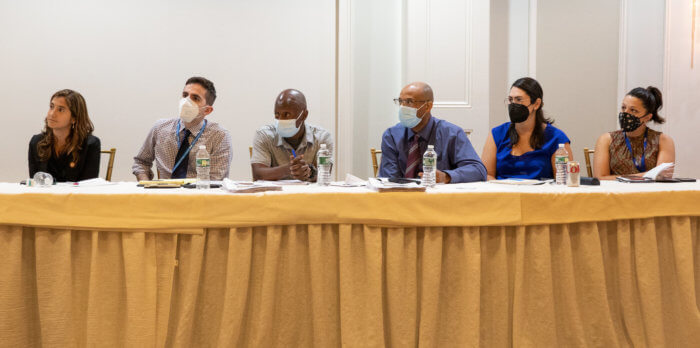
Jeanette Merrill, NYC Health + Hospital CHS spokesperson, said in a statement to the Bronx Times that public meetings like last week’s are important for community engagement, and that project representatives are committed to working with the community.
“These conversations will not always be easy, but they are necessary to deliver on Just Home’s mission of providing supportive, permanent housing for medically complex, marginalized New Yorkers,” she said.
A February 2021 publication on poverty and mass incarceration in New York published by the Brennan Center for Justice at New York University School of Law, a nonpartisan law and policy institute, found that people with a criminal record often struggle to find housing, which contributes to cycles of poverty and recidivism. According to a 2018 Prison Policy Initiative article, formerly imprisoned people are almost 10 times more likely to experience homelessness, and a lack of stable housing increases the likelihood that they return to prison.
The Corporation for Supportive Housing (CSH) argues in a winter 2022 report that supportive housing can help people coming from Rikers Island re-enter society with stability. Almost 3,000 people between 2015 and 2018 said they were homeless while jailed at Rikers Island, according to the report, which adds an estimated 2,589 people at Rikers Island in a given year need supportive housing.
Construction would not begin unless approved by the NYC Health + Hospitals Board of Directors and the City Council after a public hearing, and project representatives expect, if approved, the building would open in three years.
The city Department of Housing Preservation and Development referred to NYC Health + Hospitals for comment.
Reach Aliya Schneider at aschneider@schnepsmedia.com or (718) 260-4597. For more coverage, follow us on Twitter, Facebook and Instagram @bronxtimes















